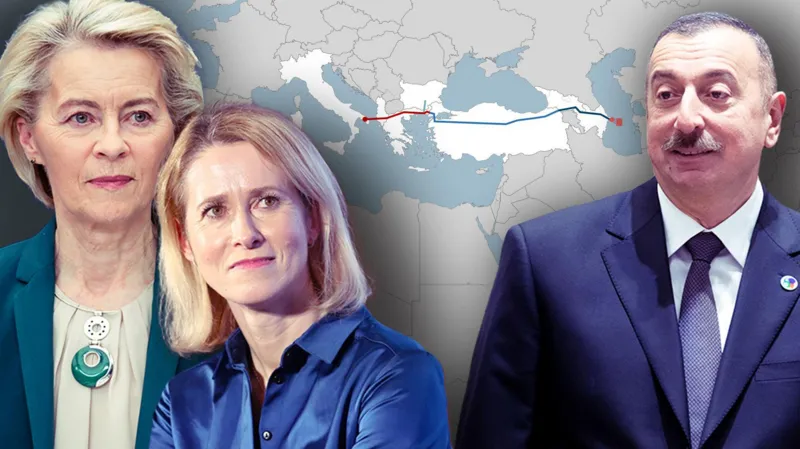Europe accused of going soft on Azerbaijan to avoid buying Russian gas
When a young peace activist was jailed for 15 years for high treason in Azerbaijan last month, his friends' anger was directed primarily at the European Union, ahead of the government that put him behind bars.

Bahruz Samadov, a 30-year-old PhD student, is facing one of the harshest sentences ever given to a critic of President Ilham Aliyev's 21-year rule. He rejects the charge as fabricated.
The EU "may keep flirting with Baku, but silence has its cost", one critic complained.
Shortly after Russia's full-scale invasion of Ukraine in 2022, European Commission President Ursula von der Leyen declared Azerbaijan a "key partner" in EU efforts to move away from Russian natural gas.
In that time, Aliyev has re-established control of the breakaway Karabakh region, causing an exodus of its entire Armenian population; he has also secured a fifth consecutive term in an election widely criticised by monitors, and cracked down on opposition and press freedom.
The European Parliament called on the EU last year to impose sanctions on Baku and end reliance on Azerbaijan's gas exports. However, top foreign policy officials avoid publicly criticising Aliyev.
When Kaja Kallas, the EU's top diplomat, visited Baku in April, she was heavily criticised by Aliyev's opponents for emphasising "great potential" for EU-Azerbaijan ties while at least 21 leading journalists were detained in Baku.
Aliyev has justified arresting journalists by the need to "protect the media landscape from external negative influences", accusing reporters of "illegally receiving funding from abroad".
He has also long accused international organisations of bias and meddling in domestic politics, and the Baku offices of the UN, the International Red Cross Committee and the BBC have all been ordered to shut down.
EU policy has in effect given Aliyev "a free hand", says Eldar Mamedov, a former Latvian diplomat who served as foreign policy adviser to the European Parliament's Social Democrat group.
"The repression, arrests of dissidents, bloggers, and opposition voices have long strained Baku-Brussels relations," he told the BBC. "Since Russia's aggression in Ukraine, this issue virtually disappeared from the agenda."
The European Union rejects the allegation.
"[The EU] is concerned by the shrinking civic space in [Azerbaijan]," a spokesman told the BBC, and has called on Baku "to release all those arbitrarily detained for exercising their fundamental rights".
"The EU has consistently raised its concerns at all levels, both in public and in private," including during Kaja Kallas's visit to Baku, he added.
The EU wants to diversify where it gets its gas, to avoid being dependent on a single supplier such as Russia.
Azerbaijan is far from being the biggest player, as its overall share in EU natural gas imports remains a modest 4.3%, despite an uptick in supplies.
But the share is much higher in some member states connected to the Southern Gas Corridor pipeline from Azerbaijan. Up to 40% of Bulgarian natural gas imports come from Azerbaijan, and for Italy and Greece it is 15%.
This makes it difficult for the EU to present a united front, according to a senior European diplomat who spoke on condition of anonymity.
"Europe in this situation does not have a huge amount of credible leverage over Azerbaijan," he said.
The power will not go out in Europe without Azerbaijani gas, but that is not the point, says Benjamin Godwin, a risk analyst specialising in the Caucasus and Central Asia.
"The EU's strategy is to have as much gas from as many different locations as possible," he says. "And while it is not reliant on Azeri gas, it would like to have more gas from Azerbaijan to ultimately reduce its dependence on Russia."
That energy partnership "does not change our stance on the human rights situation in Azerbaijan", the EU spokesman told the BBC.
President Aliyev has other benefits to Europe besides gas.
He has consistently supported Ukraine's territorial integrity in the face of Russia's invasion - a rare stance among ex-Soviet states seen by the Kremlin as allies.
Although Azerbaijan has not imposed sanctions on Russia, it has supplied Ukraine with humanitarian aid.
Baku's relations with Moscow have taken a dive in recent months.
An Azerbaijani Airlines plane crashed with the loss of 38 lives last December - apparently shot down by mistake by a Russian anti-aircraft missile.
The crisis then deepened following the deaths of two Azerbaijani men in Russian police custody.
By openly challenging Russia, Aliyev has sought to take on a larger role in a region traditionally dominated by Moscow, experts say. But he also presents himself to the West as an opponent of Vladimir Putin.
"Azerbaijan has pocketed the attention and they played it pretty well. They are seeing that all sides want to be friends with them and they are making use of that in all directions," the senior EU diplomat told the BBC.
Another well-placed European diplomat said: "We are absolutely not happy with [Azerbaijan's human rights record], but there is not much we can do."
When seven Azerbaijani investigative journalists were given long jail terms last month, the EU's diplomatic service (EEAS) said it was a "worrying development" and called for "immediate steps to ensure a safe and enabling environment for all journalists".
So far the EU has stayed silent over Bahruz Samadov's jail term for treason. But his friends say he recently tried to take his life and fear for his safety.
-BBC






